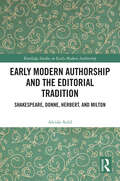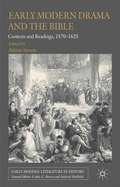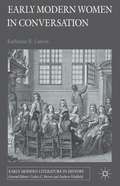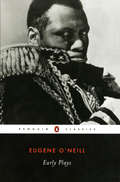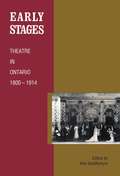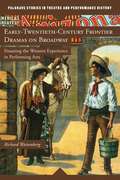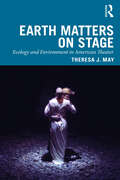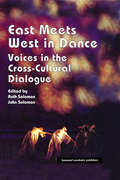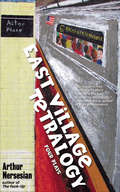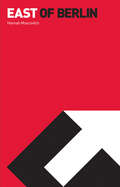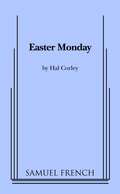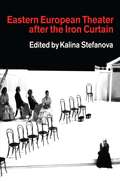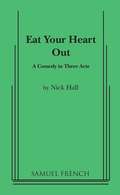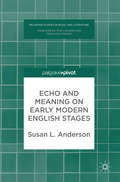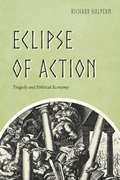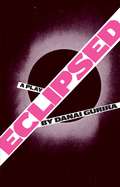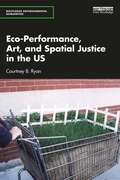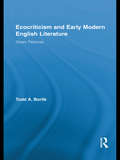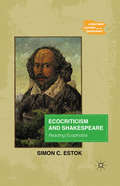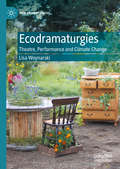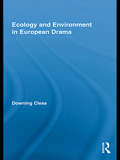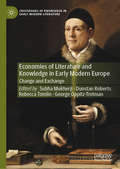- Table View
- List View
Early Modern Authorship and the Editorial Tradition: Shakespeare, Donne, Herbert, and Milton (Routledge Studies in Early Modern Authorship)
by Aleida AuldThis volume adds a new dimension to authorship studies by linking the editorial tradition to the transformative reception of early modern authors and their works across time. Aleida Auld argues that the editorial tradition provides privileged access to the reception of early modern literature, informing our understanding of certain reconfigurations and sometimes helping to produce them between their time and our own. At stake are reconfigurations of oeuvre and authorship, the relationship between the author and work, the relationship between authors, and the author’s own role in establishing an editorial tradition. Ultimately, this study recognizes that the editorial tradition is a stabilizing force while asserting that it may also be a source of strange and provocative reconceptions of early modern authors and their works in the present day. Scholars and students of early modern literature will benefit from this approach to editing as a form of reception that encompasses all the editorial decisions that are necessary to ‘put forth’ a text.
Early Modern Drama and the Bible
by Adrian StreeteEarly modern drama is steeped in biblical language, imagery and stories. This collection of essays examines the extensive and pervasive presence of scripture on the early modern stage and considers a range of plays by writers such as Shakespeare, Marlowe, Middleton, Webster, Massinger and Heywood. The introduction situates the religious, political and ideological contexts within which the relationship between stage and book was negotiated. The individual essays then explore a variety of dramatic encounters with scripture, ranging from material and verbal presences, iconoclasm, political theology, the Bible and the law, the domestic, the religious and political controversy. In this way, the capacious and widespread dramatic engagement with the early modern Bible is reconsidered. These essays offer fresh and exciting readings of early modern drama by resituating the theatre as a site of public and communal engagement with, and interrogation of, scripture.
Early Modern Drama, 1576-1642
by Julie SandersEngaging and stimulating, this Introduction provides a fresh vista of the early modern theatrical landscape. Chapters are arranged according to key genres (tragedy, revenge, satire, history play, pastoral and city comedy), punctuated by a series of focused case studies on topics ranging from repertoire to performance style, political events to the physical body of the actor, and from plays in print to the space of the playhouse. Julie Sanders encourages readers to engage with particular dramatic moments, such as opening scenes, skulls on stage or the conventions of disguise, and to apply the materials and methods contained in the book in inventive ways. A timeline and frequent cross-references provide continuity. Always alert to the possibilities of performance, Sanders reveals the remarkable story of early modern drama not through individual writers, but through repertoires and company practices, helping to relocate and re-imagine canonical plays and playwrights.
Early Modern Playhouse Manuscripts and the Editing of Shakespeare
by Paul WerstineEarly Modern Playhouse Manuscripts and the Editing of Shakespeare argues for editing Shakespeare's plays in a new way, without pretending to distinguish authorial from theatrical versions. Drawing on the work of the influential scholars A. W. Pollard and W. W. Greg, Werstine tackles the difficult issues surrounding 'foul papers' and 'promptbooks' to redefine these fundamental categories of current Shakespeare editing. In an extensive and detailed analysis, this book offers insight into the methods of theatrical personnel and a reconstruction of backstage practices in playhouses of Shakespeare's time. The book also includes a detailed analysis of nineteen manuscripts and three quartos marked up for performance - documents that together provide precious insight into how plays were put into production. Using these surviving manuscripts as a framework, Werstine goes on to explore editorial choices about what to give today's readers as 'Shakespeare'.
Early Modern Women in Conversation
by Katherine R. LarsonTo converse is, in its most fundamental sense, to engage with society. The potency of conversation as an early modern social networking tool is complicated, however, both by its gendered status in the period and by its conflation of verbal and physical interaction. Conversation was an embodied act that signified social intimacy, cohabitation, and even sexual intercourse. As such, conversation posed a particular challenge for women, whose virtuous reputation was contingent on sexual and verbal self-control. Early Modern Women in Conversation considers how five women writers from the prominent Sidney and Cavendish families negotiated the gendered interrelationship between conversation and the spatial boundaries delimiting conversational encounters to create opportunities for authoritative and socially transformative utterance within their texts. Conversation emerges in this book as a powerful rhetorical and creative practice that remaps women's relationship to space and language inearly modern England.
Early Plays
by Eugene O'Neill Jeffrey H. RichardsThis volume brings to readers a selection of Eugene O'Neill's early work, written between 1914 and 1921 and produced for the stage between 1916 and 1922. Included here are: seven one-act plays, The Moon of the Caribbees, Bound East for Cardiff, In the Zone, The Long Voyage Home, Ile, Where the Cross Is Made, and The Rope; and five full-length plays, Beyond the Horizon, The Straw, Anna Christie, and the classics The Emperor Jones and The Hairy Ape. The majority of the plays are heavily influenced by German expressionism-Freud, Nietzsche, Strindberg, and the radical leftist politics in which O'Neill was involved during his youth. Included in this unique collection is the little known and highly autobiographical play, The Straw, which draws on O'Neill's confinement in the Gaylord Farm Sanatorium.
Early Stages: Theatre in Ontario 1800 - 1914 (The Royal Society of Canada Special Publications)
by Anne SaddlemyerA circus, a production of Shakespeare, an evening of song and ventriloquism, a performance by a ‘learned pig’ – all of these offered an evening’s entertainment to the citizens of early nineteenth-century Upper Canada. Although the population in 1800 was only 90,000, a wide range of entertainers performed in towns across the province: touring companies, variety and animal acts, and theatrical troupes, professional and amateur, some home-grown and based in the garrisons, others from Montreal, New York, and London. By the end of the century, some 250 touring groups were on the road across Ontario, from Ottawa to Rat Portage (now Kenora). The lively theatre tradition of that century would extend into the next, beyond the appointment in 1913 of Ontario’s first official censor, until the outbreak the following year of the First World War. This collection of essays covers a number of facets of the growth of theatre in Ontario. Ann Saddlemyer’s introduction provides an overview of the period, and historian J.M.S. Careless focuses on the cultural environment. Novelist Robertson Davies writes on the dramatic repertoire of the period. Architect Robert Fairfield explores the structures that housed performances, from the small community halls to the grand opera houses. Theatre scholar and professional actor and director Geralrd Lenton-Young discusses variety performances. Leslie O’Dell, scholar, actor, and playwright, writes on garrison theatre, while Mary M. Brown, a teacher, actress, and director, covers travelling troupes. A chronology and bibliography, both by the theatre scholar Richard Plant, complete the work. A second volume, scheduled for future publication, will look at the development of theatre in Ontario in the twentieth century. (Ontario Historical Studies Series)
Early-Twentieth-Century Frontier Dramas on Broadway
by Richard WattenbergFrontier dramas were among the most popular and successful of early-twentieth-century Broadway type plays. The long runs of contemporary dramas not only indicate the popularity of these plays but also tell us that these plays offered views about the frontier that original audiences could and did embrace.
Earth Matters on Stage: Ecology and Environment in American Theater (Routledge Studies in Theatre, Ecology, and Performance)
by Theresa J. MayEarth Matters on Stage: Ecology and Environment in American Theater tells the story of how American theater has shaped popular understandings of the environment throughout the twentieth century as it argues for theater’s potential power in the age of climate change. Using cultural and environmental history, seven chapters interrogate key moments in American theater and American environmentalism over the course of the twentieth century in the United States. It focuses, in particular, on how drama has represented environmental injustice and how inequality has become part of the American environmental landscape. As the first book-length ecocritical study of American theater, Earth Matters examines both familiar dramas and lesser-known grassroots plays in an effort to show that theater can be a powerful force for social change from frontier drama of the late nineteenth century to the eco-theater movement. This book argues that theater has always and already been part of the history of environmental ideas and action in the United States. Earth Matters also maps the rise of an ecocritical thought and eco-theater practice – what the author calls ecodramaturgy – showing how theater has informed environmental perceptions and policies. Through key plays and productions, it identifies strategies for artists who want their work to contribute to cultural transformation in the face of climate change.
East Meets West in Dance: Voices in the Cross-Cultural Dialogue (Choreography and Dance Studies Series #Vol. 9)
by Ruth Solomon John SolomonFirst Published in 1995. Routledge is an imprint of Taylor & Francis, an informa company.
East Village Tetralogy: Four Plays
by Arthur Nersesian"Nersesian is this generation's Mark Twain and the East River is his Mississippi."--Jennifer Belle, author of High Maintenance"Award-winning playwright Arthur Nersesian has woven an effective dramatic form through four plays, each quite funny in its own way. Each yields very powerful human results while subtly investigating the major social issues of our time."--Evangelina Borges, Trying Time PressNersesian's cult status has grown from the success of his novels, and here for the first time his equal skills as a playwright are revealed to a hungry public. Three of the four plays in East Village Tetralogy have been staged off-Broadway in New York City. The four plays included in this volume are: Rent Control East Village Writer's Bloc Plea Bargains Spare Change
East of Berlin
by Hannah MoscovitchStanding outside his father's study in Paraguay, Rudi is smoking cigarettes, trying to work up the courage to go in. It has been seven years since he stood in that same spot; seven years since he left his family and their history behind him. As a teenager, Rudi discovered that his father was a doctor at Auschwitz. Trying to reconcile his inherited guilt, Rudi lashed out against his family and his friends, and eventually fled to Germany. While there, he follows in his father's footsteps by studying medicine, and falls in love with Sarah, the daughter of a Holocaust survivor. Questioning redemption, love, guilt, and the sins of the father, East of Berlin is a tour de force that follows Rudi's emotional upheaval as he comes to terms with a frightening past that was never his own.
Easter Monday
by Hal CorleyDramatic Comedy / 2m, 1f / Interior An eccentric widower, Mack has been a stay-at-home dad for twenty years, his daily existence revolving around his son Billy. Not only can't he let go, Mack's convinced he's more needed than ever. First up is pulling Billy from a dead-end copy shop job and enrollment in culinary school-after all, he was a finalist in the Pillsbury Bake-off. Then Mack discovers that Billy, adopted from infancy, has contacted his birthmother, a Washington, DC secretary about to make a first trip to New York City. Panicky Mack spends a sleepless three days coaching his son, determined to impress Adela with Billy's upbringing-and their indestructible father-son bond. Over a snowy Easter weekend, these three square off. Confronting timid Adela, Billy's romanticized ideas about his identity are turned inside out, as Mack's deepest insecurities surface. Mack is convinced the woman will psychologically lay claim to the child she gave up two decades earlier. Yet for Adela, a lasting reconnection with the boy couldn't be further from her mind. With abundant humor, Easter Monday addresses what it means to be a parent, and to be parented, illuminating both the pain and joy in finally saying goodbye to childhood. "....An interesting examination of an unusual father-son relationship... The Sondheim lyrics 'stay a child while you can be a child' are embodied in Mack, the overprotective father. In his eagerness to keep his adopted son Billy with him, Mack has in essence tried to keep him a child. He creates a wonderful world of nostalgia that is very moving... Easter Monday holds our interest, and Corley has written some beautifully evocative lines ... " -Connie Meng, NPR Radio Character Descriptions: MACK: 55-ish; a radically sentimental, unapologetic Pollyanna; unselfconscious, devoid of vanity, he's alternately tender, prickly, impatient, cuddly, bullying, at times fiercely defensive and aggressively paternal. BILLY: Mack's son, 20; attractively boyish, yet preternaturally world-weary; gentle, introspective and cautious, he has developed a short fuse, and though desperate to avoid confrontation, he can turn combative. ADELA: Billy's birthmother; 35; unprepossessing, plain-spoken and intensely focused on whatever meager task is at hand; though decidedly meek, she's capable of standing up for the truth - and herself. Please contact Samuel French, Inc. (www.samuelfrench.com) for performance licensing inquiries.
Eastern European Theatre After the Iron Curtain (Contemporary Theatre Studies #Vol. 30)
by Kalina Stefanova Ann WaughAn important new survey of Eastern European theater after the collapse of the Soviet Union. Explores all aspects of theater, from playwriting, directing and acting, to repertoire creation and theatre management. Uses material never previously published on theatre life during the Communist years. Compares theater before and after the political changes in Albania, Bulgaria, Czech Republic, Hungary, Latvia, Lithuania, Moldova, Poland,Romania, Russia, Slovakia, Ukraine. Chapters begin with introductions by well-known theatre professionals or lively interviews with a major directors or playwrights - including Yury Lyubimov, Václav Havel, Andrei Sherban and Ismail Kadare.
Eat Your Heart Out
by Nick HallComedy / 3m, 2f / Charlie's an out of work actor currently working as a waiter. The scene is a series of hilarious encounters in Manhattan restaurants both elegant and shabby. By changing the tablecloths in the course of the action, the basic setting of three tables and six chairs becomes another place. The action's uninterrupted and the comedy never stops. The other performers play several parts; the girl desperately trying to eat snails and oysters to please her fiance, the middle aged lovers so intent on each other they cannot order dinner; the rich, embittered astrologer; the timid man who never gets a waiter; the agents, directors, actors, and waiters. An amusing gallery of characters whose stories intertwine and finally involve Charlie.
Echo and Meaning on Early Modern English Stages
by Susan L. AndersonThis book examines the trope of echo in early modern literature and drama, exploring the musical, sonic, and verbal effects generated by forms of repetition on stage and in print. Focusing on examples where Echo herself appears as a character, this study shows how echoic techniques permeated literary, dramatic, and musical performance in the period, and puts forward echo as a model for engaging with sounds and texts from the past. Starting with sixteenth century translations of myths of Echo from Ovid and Longus, the book moves through the uses of echo in Elizabethan progress entertainments, commercial and court drama, Jacobean court masques, and prose romance. It places the work of well-known dramatists, such as Ben Jonson and John Webster, in the context of broader cultures of performance. The book will be of interest to scholars and students of early modern drama, music, and dance.
Eclipse of Action: Tragedy and Political Economy
by Richard HalpernAccording to traditional accounts, the history of tragedy is itself tragic: following a miraculous birth in fifth-century Athens and a brilliant resurgence in the early modern period, tragic drama then falls into a marked decline. While disputing the notion that tragedy has died, this wide-ranging study argues that it faces an unprecedented challenge in modern times from an unexpected quarter: political economy. Since Aristotle, tragedy has been seen as uniquely exhibiting the importance of action for human happiness. Beginning with Adam Smith, however, political economy has claimed that the source of happiness is primarily production. Eclipse of Action examines the tense relations between action and production, doing and making, in playwrights from Aeschylus, Marlowe, Shakespeare, and Milton to Beckett, Arthur Miller, and Sarah Kane. Richard Halpern places these figures in conversation with works by Aristotle, Smith, Hegel, Marx, Hannah Arendt, Georges Bataille, and others in order to trace the long history of the ways in which economic thought and tragic drama interact.
Eclipsed
by Danai Gurira"[Eclipsed is] a surprisingly vivacious portrait of helplessness, of the entirely human impulse to adapt, to get by even when there's little hope life will get better."--Washington Post "Eclipsed depicts the harsh realities of women's lives in a strife-torn African country with both a clear eye and a palpable empathy."--New York Times Four women in Liberia struggle to survive conditions on a rebel army base. Held as the concubines of a warlord, each "wife" must find her own means of coping amidst a situation that appears hopeless. With frail, fractured identities born from an ongoing, senseless civil war, the women build their own contained world to guard against the chaos outside. This enthralling work from award-winning playwright and actress Gurira demonstrates the human capacity to endure, even in the most desolate of circumstances. Danai Gurira's other plays include Familiar and In the Continuum, written for World AIDS Day in December 2011, which she co-wrote and co-starred in with Nikkole Salter. For In the Continuum, she was awarded an Obie Award, Outer Critics' Circle Award, and a Helen Hayes Award for her performance. She received a Whiting Writer's Award in 2012. She is best known for her role as Michonne in the hit television series, The Walking Dead.
Eclipsed
by Danai Gurira"[Eclipsed is] a surprisingly vivacious portrait of helplessness, of the entirely human impulse to adapt, to get by even when there's little hope life will get better."--Washington Post "Eclipsed depicts the harsh realities of women's lives in a strife-torn African country with both a clear eye and a palpable empathy."--New York Times Four women in Liberia struggle to survive conditions on a rebel army base. Held as the concubines of a warlord, each "wife" must find her own means of coping amidst a situation that appears hopeless. With frail, fractured identities born from an ongoing, senseless civil war, the women build their own contained world to guard against the chaos outside. This enthralling work from award-winning playwright and actress Gurira demonstrates the human capacity to endure, even in the most desolate of circumstances. Danai Gurira's other plays include Familiar and In the Continuum, written for World AIDS Day in December 2011, which she co-wrote and co-starred in with Nikkole Salter. For In the Continuum, she was awarded an Obie Award, Outer Critics' Circle Award, and a Helen Hayes Award for her performance. She received a Whiting Writer's Award in 2012. She is best known for her role as Michonne in the hit television series, The Walking Dead.
Eco-Performance, Art, and Spatial Justice in the US (Routledge Environmental Humanities)
by Courtney B. RyanIn Eco-Performance, Art, and Spatial Justice in the US, Courtney B. Ryan traces how urban artists in the US from the 1970s until today contend with environmental domestication and spatial injustice through performance. In theater, art, film, and digital media, the artists featured in this book perform everyday, spatialized micro-acts to contest the mutual containment of urbanites and nonhuman nature. Whether it is plant artist Vaughn Bell going for a city stroll in her personal biosphere, photographer Naima Green photographing Black urbanites in lush New York City parks, guerrilla gardeners launching seed bombs into abandoned city lots, or a satirical tweeter parodying BP’s response to the 2010 Deepwater Horizon oil spill, the subjects in this book challenge deeply engrained Western directives to domesticate nonhuman nature. In examining how urban eco-artists perform alternate ecologies that celebrate the interconnectedness of marginalized human, vegetal, and aquatic life, Ryan suggests that small environmental performances can expose spatial injustice and increase spatial mobility. Bringing a performance perspective to the environmental humanities, this interdisciplinary text offers readers stymied by the global climate crisis a way forward. It will appeal to a wide range of students and academics in performance, media studies, urban geography, and environmental studies.
Ecocriticism and Early Modern English Literature: Green Pastures (Routledge Studies In Renaissance Literature And Culture Ser. #16)
by Todd A. BorlikIn this timely new study, Borlik reveals the surprisingly rich potential for the emergent "green" criticism to yield fresh insights into early modern English literature. Deftly avoiding the anachronistic casting of sixteenth- and seventeenth-century authors as modern environmentalists, he argues that environmental issues, such as nature’s personhood, deforestation, energy use, air quality, climate change, and animal sentience, are formative concerns in many early modern texts. The readings infuse a new urgency in familiar works by Shakespeare, Sidney, Spenser, Marlowe, Ralegh, Jonson, Donne, and Milton. At the same time, the book forecasts how ecocriticism will bolster the reputation of less canonical authors like Drayton, Wroth, Bruno, Gascoigne, and Cavendish. Its chapters trace provocative affinities between topics such as Pythagorean ecology and the Gaia hypothesis, Ovidian tropes and green phenomenology, the disenchantment of Nature and the Little Ice Age, and early modern pastoral poetry and modern environmental ethics. It also examines the ecological onus of Renaissance poetics, while showcasing how the Elizabethans’ sense of a sophisticated interplay between nature and art can provide a precedent for ecocriticism’s current understanding of the relationship between nature and culture as "mutually constructive." Situating plays and poems alongside an eclectic array of secondary sources, including herbals, forestry laws, husbandry manuals, almanacs, and philosophical treatises on politics and ethics, Borlik demonstrates that Elizabethan and Jacobean authors were very much aware of, and concerned about, the impact of human beings on their natural surroundings.
Ecocriticism and Shakespeare
by Simon C. EstokThis book offers the term 'ecophobia' as a way of understanding and organizing representations of contempt for the natural world. Estok argues that this vocabulary is both necessary to the developing area of ecocritical studies and for our understandings of the representations of 'Nature' in Shakespeare.
Ecodramaturgies: Theatre, Performance and Climate Change (New Dramaturgies)
by Lisa WoynarskiThis book addresses theatre’s contribution to the way we think about ecology, our relationship to the environment, and what it means to be human in the context of climate change. It offers a detailed study of the ways in which contemporary performance has critiqued and re-imagined everyday ecological relationships, in more just and equitable ways. The broad spectrum of ecologically-oriented theatre and performance included here, largely from the UK, US, Canada, Europe, and Mexico, have problematised, reframed, and upended the pervasive and reductive images of climate change that tend to dominate the ecological imagination. Taking an inclusive approach this book foregrounds marginalised perspectives and the multiple social and political forces that shape climate change and related ecological crises, framing understandings of the earth as home. Recent works by Fevered Sleep, Rimini Protokoll, Violeta Luna, Deke Weaver, Metis Arts, Lucy + Jorge Orta, as well as Indigenous activist movements such as NoDAPL and Idle No More, are described in detail.
Ecology and Environment in European Drama (Routledge Advances In Theatre And Performance Studies #14)
by Downing ClessLooking at European drama through an ecological lens, this book chronicles nature and the environment as primary topics in major plays from ancient to recent times. Cless focuses on the few, yet well-known plays in which nature is at stake in the action or the environment is a dramatic force. Though theater predominantly explores human and cultural themes, these plays fully display the power of the other-than-human world and its endangerment during the history of Europe. While offering a broad overview, the book features extensive case studies of several playwrights, plays, and eco-theater productions: Aristophanes’ The Birds, Marlowe’s Doctor Faustus, Shakespeare’s A Midsummer Night’s Dream and The Tempest, and Giraudoux’s The Madwoman of Chaillot. In each case, Cless connects nature in the play to nature in the life of the playwright based on biographical research into the understanding of natural philosophy and awareness of the immediate environment that influenced the specific play. The book is one of the first of its kind in a growing field of ecocriticism and emerging eco-studies of theater.
Economies of Literature and Knowledge in Early Modern Europe: Change and Exchange (Crossroads of Knowledge in Early Modern Literature #2)
by Subha Mukherji Dunstan Roberts Rebecca Tomlin George Oppitz-TrotmanPlacing ‘literature’ at the centre of Renaissance economic knowledge, this book offers a distinct intervention in the history of early modern epistemology. It is premised on the belief that early modern practices of change and exchange produced a range of epistemic shifts and crises, which, nonetheless, lacked a systematic vocabulary. These essays collectively tap into the imaginative kernel at the core of economic experience, to grasp and give expression to some of its more elusive experiential dimensions. The essays gathered here probe the early modern interface between imaginative and mercantile knowledge, between technologies of change in the field of commerce and transactions in the sphere of cultural production, and between forms of transaction and representation. In the process, they go beyond the specific interrelation of economic life and literary work to bring back into view the thresholds between economics on the one hand, and religious, legal and natural philosophical epistemologies on the other.
